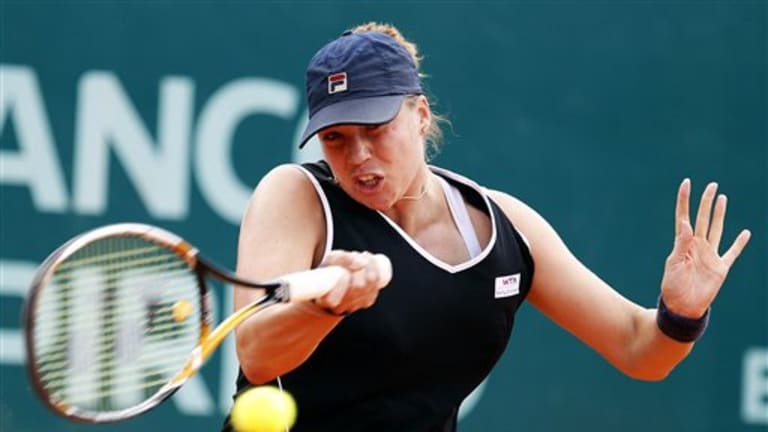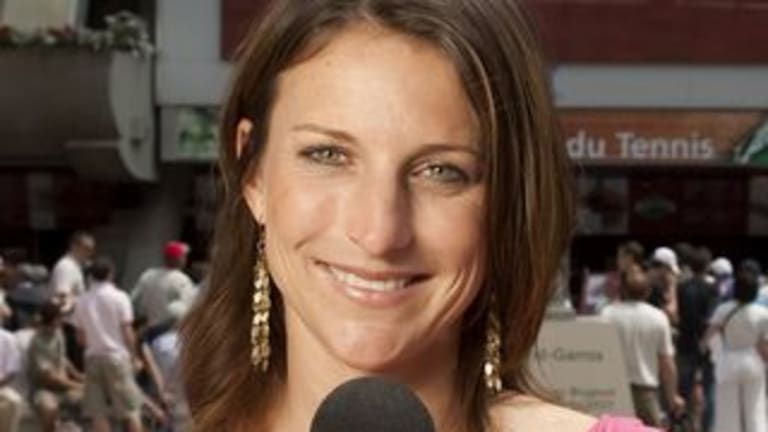by Pete Bodo
Alisa Kleybanova turned 22 on Friday, July 15th, and her birthday "celebration" included a less than festive communication with her fellow players, fans, and tour officials. She posted a message on the WTA website explaining her absence from Roland Garros and Wimbledon. In a telephone interview that aired on Tennis Channel that same day, she explained that she was off the tour and sequestered in Perugia, Italy, receiving treatment for a form of cancer, Hodgkin's Lymphoma. It was time to go public because, as she said, "I was getting a lot of questions and emails, asking me what happen because I never miss a Grand Slam before. It was a big surprise for everybody."
Those messages and questions must have been encouraging; they probably helped Kleybanova remain positive and perhaps they gave even more impetus to her determination to be cured. As she wrote, "I'm sure I'll be able to overcome this — it's just a matter of patience and time and I believe I have enough!"
Kleybanova, who has ranked as high as No. 20 in the world, will need all that help and support — and more — because tennis is a sport that treats those who fall by the wayside with extreme indifference, a kind of institutionalized cruelty that's inextricably bound up with a great source of the game's appeal, the individual resourcefulness it demands on an ever-changing basis.
Tennis, more than any other sport, is a game of motion, in motion. Tennis is a river. The sport is forever moving on. You win, you move on, and have to face losing again, usually within 24 hours. You lose, you move on — on to the next tournament, the next town, or perhaps on to home. Each week, the tour moves on. Whether you're Novak Djokovic or Joe Novak, qualifier, you have to chase the game, week-after-week, city-after-city, continent-after-continent. Thus, tennis is also about forgetting. Moving on, yes, but also leaving behind.
This situation presents some terrible challenges to those like Kleybanova, who have to leave the tour because of serious injury or illness. Greater challenges, perhaps, than almost any other athlete might face and greater certainly than those of us who live more rooted lives are likely to come up against. Nobody likes to be left behind, least of all when he or she is hurting. And that's just Kleybanova must face. The game has moved on; who really misses you, who really remembers, or cares?
One woman who knows just what Kleybanova will be going through is Tennis Channel commentator, author and former player (Wimbledon doubles champion, in fact), Corina Morariu. Back in 2001 Morariu was diagnosed with leukemia. She was treated with chemotherapy, which ultimately left her a clogged lung and a month-long battle on the razor's edge between life and death. Morariu won her battle, and ultimately returned to compete on the tour again until she retired in 2007.
Morariu has exchanged emails with Kleybanova, and says the young Russian player sounds "positive and upbeat, like the great fighter she is."
But Morariu also knows that you always start out like that. Fueled by the support of loved ones, supported by family, appreciating the novelty (if that's the right word) of a respite from the endless grind of the tour — the ceaseless moving on — you know you've got the strength, you know you can lick this thing. And while you're in the midst of treatment, you have a regimen — a specific schedule that gives you some comfort and sense of security and progress, just as your daily routine in tennis once provided those things.
"In typical athlete fashion, when I was diagnosed I soon had a game plan, a team in place, and I knew my opponent," Morariu told me the other day in a telephone conversation. "That first month, with the chemo treatments and all that, I also had a huge outpouring of support. That really helped, too. It distracted me. I felt I was still part of the tour — maybe even more than ever, because this sense of support and friendship was strong, far stronger than anything I ever felt when I was playing, for the obvious reasons."
And then there was, for lack of a better term, the utter strangeness of it all. Here you are, a paragon of health, suddenly confronted with your mortality, like some worn-out, self-abusing adult, or senior citizen. "It's such a shock," Corina said, "that initially it's almost like you're in denial. And being an athlete, you're used to working in spurts, with periods of rest. So you're used to taking some time away from that environment. With Alisa, I don't even know if it's really hit her yet. Nothing you do in your life as a player prepares you for this kind of thing."

